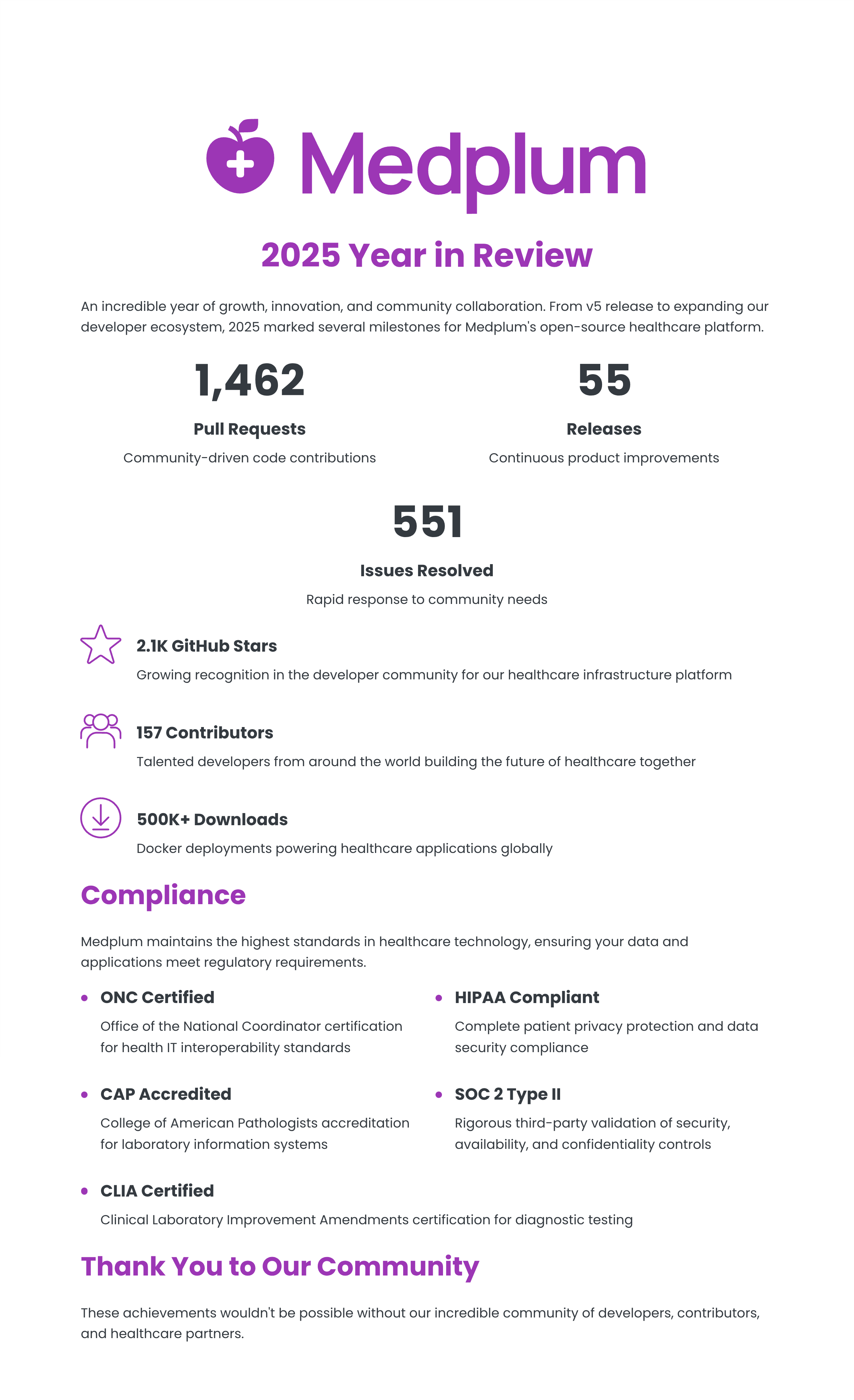Medplum Year in Review 2025

An incredible year of growth, innovation, and community. From v5 release to expanding our developer ecosystem, 2025 marked several milestones for Medplum's open-source healthcare platform.

An incredible year of growth, innovation, and community. From v5 release to expanding our developer ecosystem, 2025 marked several milestones for Medplum's open-source healthcare platform.
As part of the Medplum v5 release, we've been hard at work delivering several key improvements to our FHIR Terminology Services, which power Medplum's rich features for handling coded values:
ValueSet/$expand, allowing users to find codes by a number of different search termsConceptMap/$translate operation to handle maps with over a million entriesBelow we'll discuss each of these changes in more detail and give examples of the features available in Medplum's Terminology Services today.
We are pleased to announce the Release of Medplum v5, the next major version of the open source healthcare developer platform.
As outlined in our preparatory post in May, Medplum v5 represents a comprehensive and necessary modernization of our core stack. This release ensures our platform maintains the highest standards of performance, security, and developer experience by aligning with the latest stable versions of our critical runtime and tooling dependencies.
We're excited to share a new open-source project from the community that addresses a common developer challenge: integrating with legacy healthcare systems. HealthChain, an open-source Python framework, makes it easier to connect AI/ML pipelines to healthcare systems.
This project is a perfect example of how the open-source community is tackling real-world problems. It was created by Jennifer Jiang-Kells, an honorary researcher at the University College London Hospitals (UCLH) NHS Foundation Trust, highlighting its roots in a premier healthcare institution.
At Medplum, our mission is to provide the open source developer platform for healthcare. We believe that open source is the best way to build secure and interoperable healthcare applications. However, with the rising concern over software supply chain attacks, we understand that being "open source" isn't enough; we need to actively prove our commitment to security.
That's why a few months ago, we decided to ramp up our participation in the Open Source Security Foundation (OpenSSF). We're excited to share the progress we've made in two of their key programs: the Best Practices Badge and the Scorecard.
Medplum has become one of the first platforms to achieve certification for the Hub role in the Integrated Reporting Applications (IRA) IHE Profile, marking a milestone in radiology workflow interoperability. This certification positions Medplum as a central orchestrator for real-time synchronization between radiology applications, addressing one of healthcare's most persistent challenges: fragmented diagnostic workflows.
The IRA profile, published in October 2023 by Integrating the Healthcare Enterprise (IHE), represents a transformative approach to radiology interoperability. Built on FHIRcast 3.0.0 and FHIR R5 standards, IRA enables different applications—from PACS systems to AI tools—to share context and content seamlessly during diagnostic reporting. For Medplum, certification as a FHIRcast Hub means our platform can now coordinate complex radiology workflows where multiple applications must work together in harmony.
Healthcare APIs need flexibility. While FHIR's standard CRUD operations (create, read, update, delete) handle most use cases, real-world healthcare workflows often require custom logic that goes beyond basic data manipulation. That's why we're excited to introduce custom FHIR operations in Medplum.
FHIR operations are the "dollar sign things" – endpoints like $validate, $expand, or $match that perform specialized functions beyond standard CRUD operations. These are technically called "operations" in FHIR terminology, distinct from the basic "interactions" used for everyday data management.
Medplum is the platform of choice for technical leaders in healthcare, and that has given us a unique perspective into the transformative power of AI in healthcare - we get asked about it every single day.
We know that technical leaders feel the pressure to define and execute on an AI strategy, and to demonstrate tangible progress to teams and stakeholders, that's expected in times of rapid technical advances.
That's why we're thrilled to announce our beta support for Anthropic's Model Context Protocol (MCP), marking a significant leap forward in how large language models (LLMs) can securely and intelligently interact with healthcare infrastructure and systems of record.
Healthcare technology relies on established systems like Electronic Health Records (EHRs) and is now incorporating concepts like Unified Digital Health Platforms (UDHPs). Understanding this evolution is key to navigating the industry's direction.
Forking can look like the fastest path to control, but it often becomes a long‑term maintenance tax. Here’s a pragmatic checklist to decide—and alternatives that usually win.